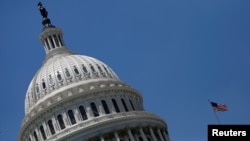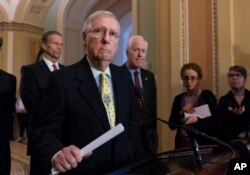Republican leaders in the U.S. Congress are moving forward with a plan to vote before the 2018 midterm elections on a bill to make permanent the temporary individual tax cuts in their recent tax overhaul.
It is not yet clear, however, if the plan would pick up support from Democrats, whose votes would be needed to pass legislation in the Senate.
The Republican tax law, approved in December without Democratic support, permanently cut the top corporate rate to 21 percent from 35 percent and created a permanent deduction for pass-through businesses. It created lower rates and new credits for individuals, but those expire at the end of 2025.
Democrats have said the tax code rewrite favors businesses and the wealthy, and that working-class taxpayers will see little benefit in their paychecks.
The nonpartisan Congressional Budget Office said last week that the tax bill, as written, is projected to add $1.9 trillion to the national debt over the next decade.
"We fully intend to make these things permanent, and that's something we'll be acting on later this year," House Speaker Paul Ryan told reporters on Tuesday, referring to the individual rates.
Making the individual cuts permanent after 2025 would cost an additional $1.5 trillion over the next decade, according to a Tax Foundation analysis of data from the nonpartisan Joint Committee on Taxation.
Senate Majority Leader Mitch McConnell, asked if he would hold a vote, said that if Democrats are interested, "that's something we ought to take a look at."
But many Democrats have already said Republicans could have prioritized low- and moderate-income taxpayers over the wealthy and businesses when writing permanent sections of the original law.
In order to comply with the Senate rules that allowed Republicans to pass the tax overhaul with a simple majority - and no Democratic support - the measure was not supposed to add more than $1.5 trillion to the U.S. debt over the next decade.
"Look, we'd have to see what their bill is," Senate Minority Leader Chuck Schumer said.
In order to make the individual rate cuts permanent, other parts of the bill should be renegotiated, some Democrats have said.
"Let's see what they do, but if they're going to create more debt, and they're not going to pay for it ... I think we can show the American people that is a shell game," Representative Steny Hoyer, the No. 2 House Democrat, told reporters.




























